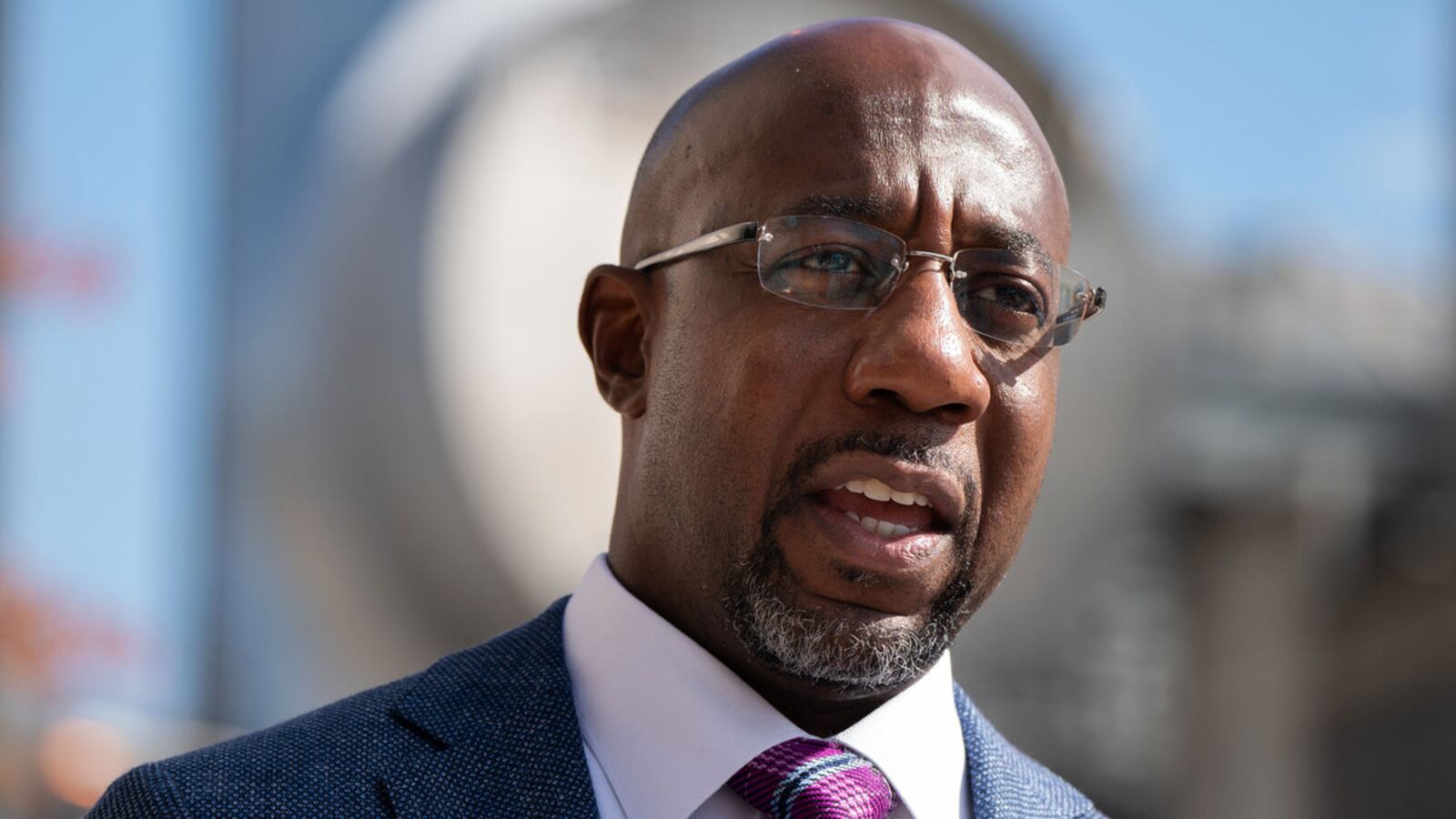ATLANTA—Few enter the dirty fray of politics with the sterling credentials Raphael Warnock did when he launched his bid for U.S. Senate in Georgia, backed by the full weight of his title: pastor at Dr. Martin Luther King Jr.’s onetime pulpit at Ebenezer Baptist Church in Atlanta.
But as the all-important Senate runoff campaign enters a critical stretch, Republicans believe they’ve found the quickest way to bring Warnock down to earth—by painting him as a hypocrite on an issue of central concern to GOP base voters and conservative Christians.
On the biggest stage of the campaign, their Dec. 6 debate, Sen. Kelly Loeffler (R-GA) quickly went to the heart of that issue. “I’m not going to be lectured,” Loeffler told Warnock from the podium, “by someone that uses the Bible to justify abortion.”
The full-throated attack on Warnock’s branding as a “pro-choice pastor” that night had been presaged by an onslaught of similar remarks by Loeffler and her allies. "There is no such thing as a pro-choice pastor," said Rep. Doug Collins (R-GA), the former Loeffler rival she edged out in the November election, at a rally the week before. "What you have is a lie from the bed of hell. It is time to send it back to Ebenezer Baptist Church."
And those attacks have been echoed and amplified in the campaign in the days since Loeffler’s broadside, with the senator and her surrogates criss-crossing Georgia to slam Warnock’s views on abortion and to tout her own anti-abortion rights record. Other ministers in the state joined in: this week, 25 pastors of Black churches—some with close ties to Trump and the GOP—sent a letter to Warnock confronting him on his views.
“As a Christian pastor and as a Black leader, you have a duty to denounce the evil of abortion, which kills a disproportionate number of Black children,” they wrote. “Your open advocacy of abortion is a scandal to the faith and to the Black community.”
The issue of abortion works for Republicans not only as an avenue to tarnish Warnock’s image as a faith leader but to galvanize their base of voters, who will need to show up in droves for Loeffler and Sen. David Perdue (R-GA) to prevail in the Jan. 5 runoffs.
There are far more single-issue abortion voters on the right than the left, said Mallory Quigley, spokesperson for the anti-abortion group Susan B. Anthony List. The group has sent field organizers and volunteers to Georgia with a goal of contacting 1 million voters ahead of Jan. 5, delivering the message that a Democratic victory in Georgia, and Democratic control of the Senate, would be a major setback toward the goal of restricting abortion access.
The GOP candidates “are talking about it because it’s a political winner,” said Quigley, who argued Democrats are now avoiding the issue because their emphasis on it in previous election cycles backfired. After President-elect Joe Biden’s visit on Tuesday to stump for Warnock, and fellow Senate candidate Jon Ossoff, SBA List charged that the Democrats were “hiding” their views on the topic. “Since the Democrats won’t tell voters the truth,” said the group, “our canvassers will.”
Democrats, however, reject that idea. “There’s no way anyone can claim Rev. Warnock is not talking about this,” said Staci Fox, CEO of Planned Parenthood Southeast. “This is an issue that is fundamental to who he is.”
Warnock has frequently tweeted to his 500,000 Twitter followers that he is proudly a “pro-choice pastor.” And in response to Loeffler’s broadside at the debate, Warnock elucidated his stance on the issue, though he steered clear of his rival’s suggestion he is a hypocrite.
“I have a profound reverence for life, and an abiding respect for choice,” said Warnock. “The question is, whose decision is it? And I happen to think a patient’s room is too small a place for a woman, her doctor, and the U.S. government. I think that’s too many people in the room.” Warnock, who has a long record of community health work in his career as a pastor, then pivoted to talking about the state’s abysmal rates of maternal mortality and the need to address it.
A Baptist minister turned Democratic politician, Warnock has argued from the beginning of his campaign that his faith, and his role as a religious leader, is consistent with support for access to abortion.
The reverend is far from the first in his party to thread such a needle. But he’s doing so under the bright lights of a nationally watched campaign for Senate—with control of the chamber riding on his success—that happens to be unfolding in the Deep South. In Georgia, nearly 40 percent of residents are evangelical Christians, a group that believes abortion should be illegal by a three-to-one margin, according to a 2019 Pew Research poll.
The Peach State has also given rise to some of the most extreme anti-abortion groups in the country. One of them, Georgia Right to Life, recently came out in opposition to the coronavirus vaccine, claiming that it was fabricated from fetal cells—a claim the vaccine makers say is false. The group has not endorsed Loeffler.
Loeffler, meanwhile, has emphasized her staunch opposition to abortion at every turn since being appointed to the Senate in December 2019. The first six bills she cosponsored after being sworn into the Senate in January all related to abortion. The wealthy senator, who donates her salary each quarter to charity, frequently cuts those checks to anti-abortion groups in Georgia.
But competing against Collins for a spot in the January runoff, Loeffler raced to the right, running ads that proclaimed herself “more conservative than Attila the Hun,” referencing the fifth century European warlord. Collins, a conservative firebrand himself, raced to Twitter to argue that Attila was, in fact, pro-abortion. When Justice Ruth Bader Ginsburg, an icon to abortion rights advocates, died in September, Loeffler expressed her condolences, while Collins tweeted "RIP to the more than 30 million innocent babies that have been murdered during the decades that Ruth Bader Ginsburg defended pro-abortion laws.”
After defeating Collins in the November election, Loeffler has continued the focus on abortion. But in that same election, Georgia’s electoral votes were won, for the first time in three decades, by a Democratic presidential candidate who supports abortion rights.
Loeffler’s opponents believe that means the senator’s hardline stance on the issue may backfire, particularly in suburban areas that have shifted rapidly toward Democrats. Those are precisely the areas Loeffler, a businesswoman and pro sports team owner, was supposed to appeal to when she was appointed to the Senate in 2019—before she took the hard-right turn needed to edge out Collins for a spot in the runoff.
An uncompromising anti-abortion stance is not the political credential that it once was with Georgia voters, said state Sen. Jen Jordan, a Democrat who represents traditionally Republican-leaning suburban areas to Atlanta’s north.
“It’s weird that such a strong businesswoman, in terms of their framing of her, that the one thing she’s so focused on is this issue of choice,” Jordan told The Daily Beast. “She keeps going back to it because she thinks she has to, for purposes of getting out the evangelicals whose only issue is life, really.”
Still, few states currently have so charged an atmosphere around abortion than Georgia does. Shortly after taking office in 2019, Republican Gov. Brian Kemp—who later appointed Loeffler to the Senate—threw his weight behind a bill that would have effectively banned abortions after six weeks of pregnancy. The so-called “fetal heartbeat” legislation, H.B. 481, passed the legislature in April 2019, making Georgia one of four states to have imposed some of the strictest abortion rules in the country.
The backlash was intense. Luminaries in the film industry, which has a major presence in Georgia, threatened to boycott the state if the law stood. Public polling showed that more Georgians opposed the bill than supported it. Democrats in the state were outraged at Kemp and the GOP, and figures in the party say it spurred women to speak out and get involved in politics. “I think they kind of almost woke up after Trump was elected,” said Jordan. “Then Kemp’s push on 481 just really pushed them over the edge.”
After a long legal battle, a federal judge in Atlanta struck down the bill this summer, ruling it unconstitutional. Kemp has vowed to appeal. But the impact is still being felt, say Democrats who point to the reaction as a sign that hard-line abortion measures were never popular to begin with.
“It was at that moment it became clear to everyone in the political arena in Georgia this was not your old school, traditional Republican Party anymore,” said state Rep. Beth Moore, a first-term Democrat who introduced a bill to repeal the heartbeat legislation. Moore said “even the most conservative women I know in the Atlanta suburbs are still pro-choice,” in large part because of the increased openness around medical complications of pregnancies, a driving factor behind many abortions.
Republicans thought the bill would help them with the suburban white women they’d been losing, argued Nabilah Islam, a Democratic activist who previously ran for Congress in Gwinnett County, outside Atlanta. “It clearly didn't, as you saw in the general election… we crushed it in the suburbs,” she said.
Indeed, in 2020, Democrats from Biden to Warnock and Ossoff carried suburban precincts that Republicans were winning as recently as 2017. These areas were pivotal to Biden’s 12,000-vote victory over President Donald Trump in Georgia, and the Democrats will need to increase their margins there to defeat Loeffler and Perdue.
Outside groups on both sides of the abortion issue have made big plans for mobilizing around it in Georgia. Planned Parenthood Votes, the political arm of the abortion rights group, has spent over $500,000 in digital and TV ads in support of Warnock and Ossoff. The anti-abortion SBA List, meanwhile, has invested over $4 million in ads for the runoff, in addition to field organizing.
So far, the GOP candidates and their surrogates have largely campaigned outside of metro Atlanta, finding enthusiastic, receptive audiences in deep-red rural pockets of the state. When they talk about Warnock, abortion is often the first thing they mention.
“It is killing me to try to figure out one of the opponents in this race… this pastor,” began former vice-presidential nominee Sarah Palin at a stop in the north Georgia town of Gainesville last week in support of the Republican ticket. “Yeah, no, I am looking at him, saying, how does that work? How does that work? A pastor, from the pulpit, who is pro-abortion, who evidently has never learned that as he’s preaching peace, peace, justice, that peace begins in the womb! And that justice means protecting God’s most precious and most innocent creation, and that is an innocent life.”
“So for a pastor to be preaching otherwise really perplexes me,” said Palin to a fired-up crowd. “Murderers!” one rallygoer shouted.
To some Warnock supporters, like Jordan, the reverend might have seized the moment on the debate stage to explain how he approaches the issue from a faith perspective. But, she said, “he said exactly what he needed to say… I’d love to hear him speak more on this, because I do think it is such a significant, important issue for women.”
Inadvertently, said Jordan, Loffler may ultimately have reminded a general audience unfamiliar with Warnock that the Baptist preacher is, in fact, pro-choice—a fact that may not necessarily be obvious to many, given his background. “In some ways,” she said, “when she throws that flag up, it may be helpful to him.”







